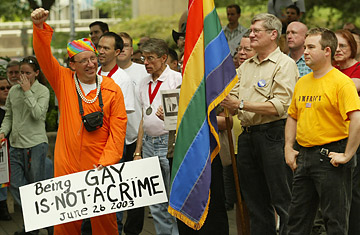
Gay rights supporters in Houston celebrate the landmark U.S. Supreme Court decision in the Lawrence vs. Texas case outside City Hall, June 26, 2003.
Five years ago this week, the United State Supreme Court delivered its most sweeping gay rights decision ever, striking down laws in Texas and other states that had criminalized sex between gays. The court erected a shield of privacy around sexual behavior for all consenting adults, and in doing so paved the way for other milestones in the gay rights legal movement, including judicial victories for gay marriage in Nov. 2003 in Massachusetts and this year in California.
The decision in the Lawrence v. Texas case overturned convictions against two Houston men, whom police had arrested after busting into their home and finding them engaged in sex. And for the first time in their lives, thousands of gay men and women who lived in states where sodomy had been illegal were free to be gay without being criminals. Gay rights groups held spontaneous celebrations in dozens of U.S. cities
But matched against their joy was a storm of protests, beginning from right inside the nation's top courthouse itself. Justice Antonin Scalia read aloud from the bench his withering dissent that morning five years ago. Joined by then-Chief Justice Rehnquist and Justice Clarence Thomas, Scalia called the decision to strike down laws against sodomy "a massive disruption of the current social order," and predicted that it would lead to the collapse of laws against gay marriage, fornication, bigamy, adultery, adult incest, bestiality, and obscenity. "This effectively decrees the end of all morals legislation."
But in the five years since Lawrence came down, this much is clear: Scalia was not all wrong. Indeed, his central point — that the decision would give sustenance to a range of challenges to gay- and sex-related laws — has proven prescient.
The legal changes wrought by Lawrence have been considerable. Both the Massachusetts and California marriage cases, for instance, cite Lawrence. So have cases in Alabama involving sex toys and in Florida involving gay adoptions, and just last month, a Ninth Circuit Court of Appeals decision cited Lawrence in holding for the first time that the military's exclusion of openly gay members must be based on more than simple moral disapproval of homosexuals. That case has been sent back to lower courts for further proceedings, but is already seen as a major challenge to the "don't ask, don't tell" policy of the U.S. Armed Forces.
Just one day after Lawrence, and in light of the ruling, the Kansas Supreme Court ordered reconsideration of a case involving an 18-year-old who had been sentenced to prison for 17 years for initiating oral sex on a 14-year-old boy. If the younger boy had been a girl, state law would have capped the 17-year-old's sentence to 15 months under the so-called "Romeo and Juliet" provision like the ones found in many states. In 2005, the case reached the Kansas high court, which ruled that the sentence was unconstitutional, and, citing Lawrence, said the statute's protections must be extended to same-sex incidents.
Not all of the cases citing Lawrence have been decided in favor of gay-rights plaintiffs. Florida's ban on adoption by gay couples, for instance, has stood. But the impact of Lawrence v. Texas will likely only grow, say the lawyers involved in the arguments five years ago. "What Lawrence really means is that it is no longer enough to simply disapprove of conduct for the majority to make it a crime," says Paul Smith, the attorney who had argued before the court urging it to strike down the sodomy statutes.
"Was Scalia right? Well, it depends on how you read what he said," Smith says. "If you think he meant that the decision would upend the way the law treats homosexuals, then I think he was right. But he also warned that the decision would lead to a massive social upheaval. And just like we found in Massachusetts after the gay marriage ruling, that hasn't happened at all. These laws haven't changed the way anybody else lives their life." He adds, "I didn't spend a lot of time listening to what Justice Scalia was saying. And I wasn't really focused on what the implications of the case would in the future. Just knowing what we had accomplished at the moment [the striking down of the sodomy laws] was tremendous."
Scalia was indeed apocalyptic back in 2005. "It is clear from this that the Court has taken sides in the culture war, departing from its role of assuring, as neutral observer, that the democratic rules of engagement are observed," he wrote. "Many Americans do not want persons who openly engage in homosexual conduct as partners in their business, as scoutmasters for their children, as teachers in their children's schools, or as boarders in their home. They view this as protecting themselves and their families from a lifestyle that they believe to be immoral and destructive."
Those views are changing, and fairly quickly. But the lasting impact of Lawrence will likely be that no matter what the majority of Americans think about gays in the future, lawmakers and courts alike will find it nearly impossible to justify criminal sanctions — just as Scalia warned. Of course, Scalia's wasn't the only one who spoke about gays that day. "The State cannot demean their existence or control their destiny by making their private sexual conduct a crime," Justice Anthony Kennedy wrote in the majority opinion. "Their right to liberty under the Due Process Clause gives them the full right to engage in their conduct without intervention of the government." And despite the loud fulminations of Scalia's minority opinion, it is Kennedy's words that count.
